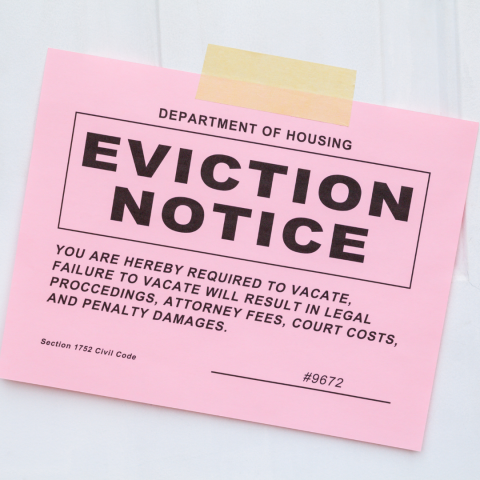
Housing, Health, and Humanity: Why Eviction Is a Reproductive Justice Issue
It’s no surprise that our country is still in the grip of a maternal health crisis—but what’s too often overlooked is how deeply residential eviction fuels this crisis, especially for Black women. It’s not just about losing a roof over your head—it’s about carrying life while carrying terror. About trying to prepare for birth, while not knowing if you’ll be forced to move before you are ready. Stable housing is a cornerstone of maternal health, shaping birth outcomes long before labor begins. This often-overlooked truth is something I’ve long felt in my bones.
When I began my journey exploring how neighborhoods impact preterm birth risk among Black women, I wasn’t doing research just for intellectual curiosity. I was honoring my own lived experience—thinking of the women I grew up with, my friends, my neighbors, and especially my own mother. My work is a love letter to them: a commitment to see, hear, and restore dignity to the Black mothers too often treated as invisible. As a proud Detroit native and a Black woman, I’m not just studying these issues—I’m living with the legacy of them.
I know firsthand what it means to be the child of a mother whom society deemed unworthy of compassion, of protection, of basic human dignity. And every day, I strive to be the kind of advocate I wish my own mother had—someone who sees her fully and fights for her fiercely.
As a researcher and as a mother, I also carry the future with me—especially when I look at my daughter. I ask myself: What kind of world do I want her to inherit? If I want better for her and other Black women’s daughters, I have to be part of building it—brick by brick, data point by data point, story by story.
That’s why I launched the Social Epidemiology to Combat Unjust Residential Evictions (SECURE) Study. In deep partnership with a multigenerational board of Black women local, national, and international leaders, we set out to quantify the magnitude and severity of court-ordered and illegal residential evictions—and to center the voices and experiences of those most impacted.
We surveyed over 1,400 Black women of reproductive age (18–46) across Detroit’s Wayne, Oakland, and Macomb counties. Notably, 88% of respondents had previously given birth.
And what we found was striking.
Black women who lived in neighborhoods with higher rates of eviction threat during pregnancy (compared to before) were 68% more likely to have a preterm birth, compared to those living in neighborhoods with consistently low eviction rates, over time. This isn’t just stress—it’s trauma. It’s structural violence showing up in Black women’s bodies and impacting their birth outcomes. Outcomes that are not driven by pre-existing medical conditions but are the results of a system that consistently fails to protect Black women.
What’s even more alarming: women who lived in high eviction neighborhoods, over time, were between 2 and 4 times more likely to have emotional suffering during pregnancy. This suggests that observing neighbors being evicted causes toxic stress—and increases risk of adverse maternal and infant outcomes.
Some of our other most surprising findings include:
More than 50% of Black women participants experienced eviction—half of those were illegal evictions—regardless of neighborhood, income level or education. Participants who were illegally evicted most commonly said their belongings were removed, they were illegally locked out and/or had utilities shut off. Twenty-five percent of Black women surveyed experienced eviction as a child. These are not just statistics. They’re a reflection of the ongoing structural violence Black women endure, even in spaces that should feel most sacred: their homes and communities.
Also, nearly 30% of women in the study lived in neighborhoods where eviction threats were a constant—before and during pregnancy. In some areas, over a quarter of renter-occupied homes faced eviction threats in a single year. Many of these homes were targeted multiple times, with landlords repeatedly filing eviction notices against the same addresses. This cycle of instability creates a cloud of fear and toxic stress that hangs over entire communities—impacting even those who are not directly involved.
This work is about more than eviction. It’s about life and death. It’s about Black maternal and infant health, and therefore, entire communities. It’s about making sure Black women—and their families—don’t just survive, but thrive, and have the stability, dignity, and joy that every human being deserves.
So, how do we move forward?
To reduce preterm births, improve maternal health, and tackle housing instability for Black women, we must confront the root causes—and that means addressing the racial wealth gap, which created the eviction crisis in the first place. This is more than just a policy failure—it’s a direct result of historical and ongoing racial injustice in every sector of our society, especially housing..
Our boldest and most effective recommendation: government-funded reparations for Black American descendants of U.S. slavery. Reparations is the best way to eliminate the racial wealth gap that places Black families at heightened risk for eviction.
But there are also urgent steps we must take now:
Strengthen tenant protections, enforce housing laws, and hold landlords accountable for civil and human rights violations.
Support pregnant and postpartum patients through healthcare systems by screening for housing-related stress and connecting them to community and mental health resources.
Expand federal investment in affordable housing and emergency housing assistance, especially for those disproportionately affected by eviction.
Expand the Adverse Childhood Experiences (ACEs) scale to include eviction—then invest in strategies to mitigate its long-term impact on children and families.
This work is deeply personal to me. I do it for our daughters—and for the mothers and grandmothers who came before me. I do it because I know what’s at stake.
I hope this research doesn’t just inform policy—I hope it sparks transformative action. Because if we are serious about improving maternal health in this country, we must confront all the interconnected systems of oppression that threaten wellbeing, and safe, stable housing is a crucial one. We must start by truly listening to Black women. And we must be clear that individual and community-level evictions are a threat to the reproductive rights of Black women.



The views and opinions expressed in this post are those of the author(s) and do not necessarily reflect those of MomsRising.org.
MomsRising.org strongly encourages our readers to post comments in response to blog posts. We value diversity of opinions and perspectives. Our goals for this space are to be educational, thought-provoking, and respectful. So we actively moderate comments and we reserve the right to edit or remove comments that undermine these goals. Thanks!